might as well 和 may as well 的用法区别
- 格式:pdf
- 大小:189.43 KB
- 文档页数:2
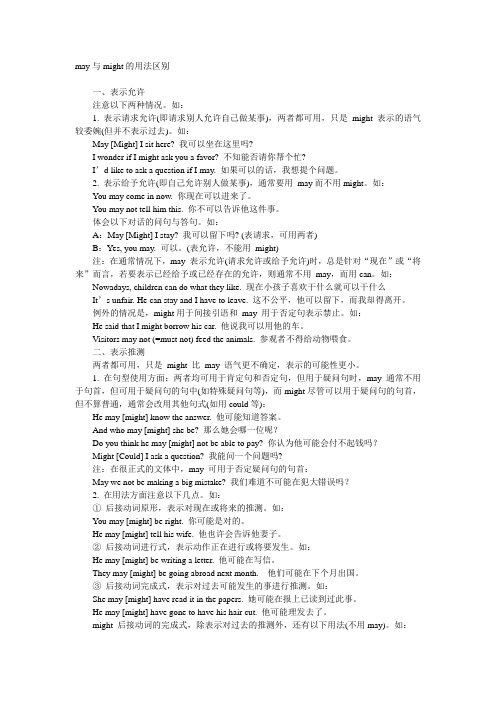
may与might的用法区别一、表示允许注意以下两种情况。
如:1. 表示请求允许(即请求别人允许自己做某事),两者都可用,只是might 表示的语气较委婉(但并不表示过去)。
如:May [Might] I sit here? 我可以坐在这里吗?I wonder if I might ask you a favor? 不知能否请你帮个忙?I’d like to ask a question if I may. 如果可以的话,我想提个问题。
2. 表示给予允许(即自己允许别人做某事),通常要用may而不用might。
如:You may come in now. 你现在可以进来了。
You may not tell him this. 你不可以告诉他这件事。
体会以下对话的问句与答句。
如:A:May [Might] I stay? 我可以留下吗? (表请求,可用两者)B:Yes, you may. 可以。
(表允许,不能用might)注:在通常情况下,may 表示允许(请求允许或给予允许)时,总是针对“现在”或“将来”而言,若要表示已经给予或已经存在的允许,则通常不用may,而用can。
如:Nowadays, children can do what they like. 现在小孩子喜欢干什么就可以干什么It’s unfair. He can stay and I have to leave. 这不公平,他可以留下,而我却得离开。
例外的情况是,might用于间接引语和may 用于否定句表示禁止。
如:He said that I might borrow his car. 他说我可以用他的车。
Visitors may not (=must not) feed the animals. 参观者不得给动物喂食。
二、表示推测两者都可用,只是might 比may 语气更不确定,表示的可能性更小。
1. 在句型使用方面:两者均可用于肯定句和否定句,但用于疑问句时,may通常不用于句首,但可用于疑问句的句中(如特殊疑问句等),而might尽管可以用于疑问句的句首,但不算普通,通常会改用其他句式(如用could等):He may [might] know the answer. 他可能知道答案。
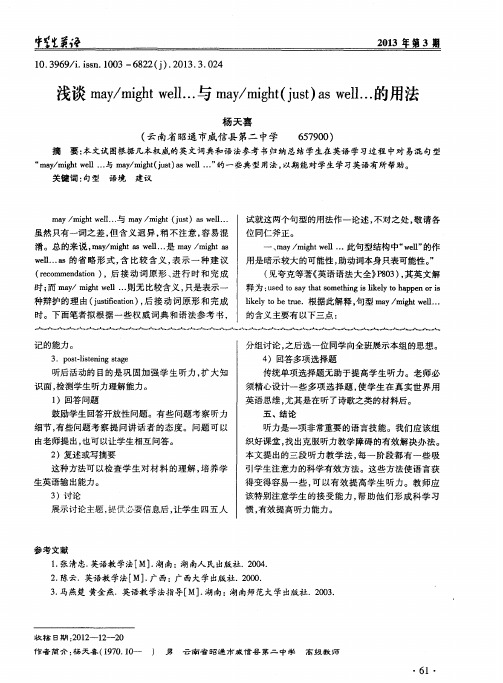

can和may的用法区别Can 的用法:(1)“can”表达能力句型can + V …(=be able to + V…)例:I can do it in another way.(=I am able to do it in another way.)(我能以别的方法来做这件事。
)例:He said he couldn't walk any step farther.(=He said he was unable to walk any step farther.)(他说他再一步也走不动了。
)解说如例所示“can…”在表达能力时可以和“be able to…”通用,如果要以完成时表达能力,通常只能使用“be able to…”。
例:Since that accident, he has been unable to leave the house.(自从那次意外事件,他就一直无法离开家。
)(2)“can”表达许可例:Can I use your telephone?(我可以借用你的吗?)Yes, of course you can.(可以呀,当然可以。
)No, I'm afraid you can't . I'm waiting for a long distance call from Shenzhen.(不好,我想不好,我正在等要打进来的长途。
)解说表达许可基本上可分为“请求”和“准许”两种。
表达请求可用“Can I/we…?”,“May I /we…?”,或“Could I/we…?”等。
表达准许则用“…can/may + V…。
”关于“can”与“may”的区别,有些文法书讲得很多,但是在现代英语,无论是美式英语或英式英语,都通用,只是“may”较为正式的用语,所以常用于writing. “Could I/we…?”或“You could…”是许可的宛转表达法,此处的“could”是指现在或将来,并无“过去”的意思。

一、as well 是一个副词短语,意为“也;还”,相当于also,too 和in addition,经常放在句尾。
例如:We look forward very much to seeing you again and to meeting your wife as well.我们非常期待再次见到你,也期待见到你的妻子。
Your mother is coming as well, so make sure to include her in the head count.你妈妈也要来,所以一定要把她算进去。
I included all of my receipts as well, in case you need them.我也包括了我所有的收据,以防你需要。
二、as well 或just as well 用来表示某些事可能是好事,意为“无妨;幸好”,例如:It’s as well to have a good camera with you when you visit the bird park.当你参观鸟类公园时,带上一个好相机也无妨。
It’s just as well we didn’t go to the lecture, because it was cancelled.幸好我们没去听讲座,因为讲座取消了。
三、词组might as well 和may as well 表示当其他事情没发生,没有理由不去做某件事,常意为“只好(做);(做…)也无妨;(几乎)和…一样”,might as well 比may as well 更普遍,例如:I might as well paint the bedroom myself; no one else is going to do it. 我还是自己粉刷卧室吧,没人会做的。
We may as well go out tonight because there’s not much on TV.今晚我们还是出去走走吧,因为电视上的节目不多。
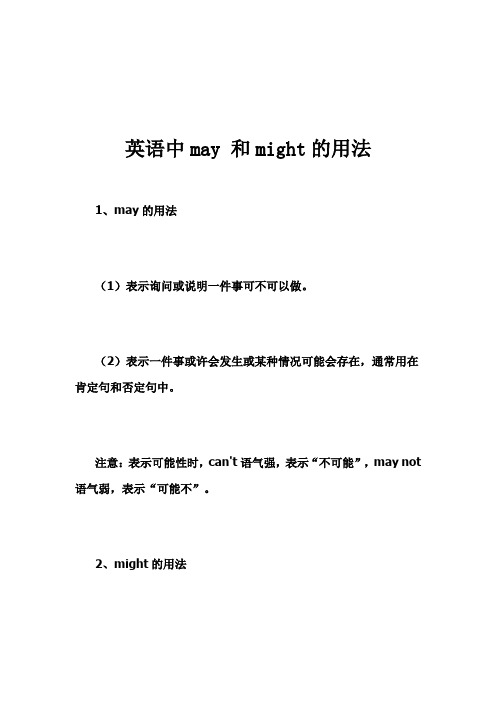
英语中may 和might的用法
1、may的用法
(1)表示询问或说明一件事可不可以做。
(2)表示一件事或许会发生或某种情况可能会存在,通常用在肯定句和否定句中。
注意:表示可能性时,can't语气强,表示“不可能”,may not 语气弱,表示“可能不”。
2、might的用法
(1)表示询问或允许,指的是过去时间。
(2)表示可能发生的事,可以指过去时间,也可以指现在时间,语气更加不肯定,可能性比may小一些。
3、may与might的特殊用法
(1)“may+主语+动词原形”表示祝愿。
(2)“may/ might well+动词原形”表示(完全)能,很可能。
(3)“may/ might as well+动词原形”表示最好,满可以,倒不如。
(4)may be 是“情态动词+系动词be”结构,表示“可能有,可能在”,否定式为may not be。
maybe是一个词,为副词,意为“大概,或许,可能”,在句中作状语。

智 课 网 雅 思 备 考 资 料实用英语精讲:Might as well 和may aswell的用法及区别might as well和may as well是英语口语中使用频率较高的词组,在不同的语境下,这两个词组有相同的意思但也有所不同。
下面我们来用例子更直观地理解一下。
口语中用到might as well和may as well的机会还是挺多的,在不同的语境下,这两个词组有相同的意思但也有所不同。
下面我们来用例子更直观地理解一下。
如果你‘might as well do something’或者 ‘may as well do something’,意思就是你没有理由不去做某件事。
比如:We might as well finish this work tonight – it will only take another half an hour.这里的might as well就相当于在说,我们没有理由不完成这项任务,因为已经基本完成了。
又比如:“This hotel has a special offer at the moment – three nights for the price of two. So shall we stay for three nights instead of two?”“Yes, we may as well I suppose, as it won’t cost any more.”这里的may as well也相当于在说没理由我们不再待一个晚上,因为特价,不待白不待。
有时候我们也常把这两个词组缩短来使用,比如上面的第一个例子也可以简化成:“Shall we finish this work tonight? It will only take another half an hour.”“Yes, might as well!”以上是表示相同意思的两组词,但是指值得注意的是might aswell也有不同意思,在某些语境中,比如:Susan: “What are you doing this evening?”Mary: “I might go to the theatre.”Susan: “Oh, I might as well.”这里Susan其实用的并不是真正合在一起的词组might aswell,而是Might + as well.所以这里的as well就相当于too或者also,意思是我可能也去,而不是我没有理由不去。

May, might, can, could 表可能性1)may/might 表示‘可能’,往往可以交替使用,并无时间上的差异,只是用might 在口气上比用may 更加不甚肯定,从而比较婉转。
may/might 既可表示现在的‘可能’:e.g. It may/might be true.He may/might be still waiting at the door.也可表将来的‘ 可能’ :e.g. He may/might leave tomorrow.He may/might not to leave next week.He may be in the office.2)用can /could 表示现在的‘可能’,在口气上could 比较婉转。
e.g. That’s not mine. Whose can it be ?It could be John's. 用can ,表示‘可能’,较多的用于否定句中,而could 则不受此限。
e.g. If you don’t have a guide, you could lose your way.(=it’s possible for you to lose your way.)It can’t/couldn’t be true.The moon cannot always be at the full.can 与may 的区别(=It’s possible for the road to be blocked.)The road may be blocked.(=It’s possible that the road is blocked.)Another example:Mr. Reed is in poor health. He can be ill at any time.Mr. Reed looks pale. He may be ill.She may/might have missed the train.She can’t/couldn’t have missed the train.用‘might/could+ 不定式完成体’ 有时可以表示本来可能发生但没有发生的,或者本来可能完成却没有完成的动作。
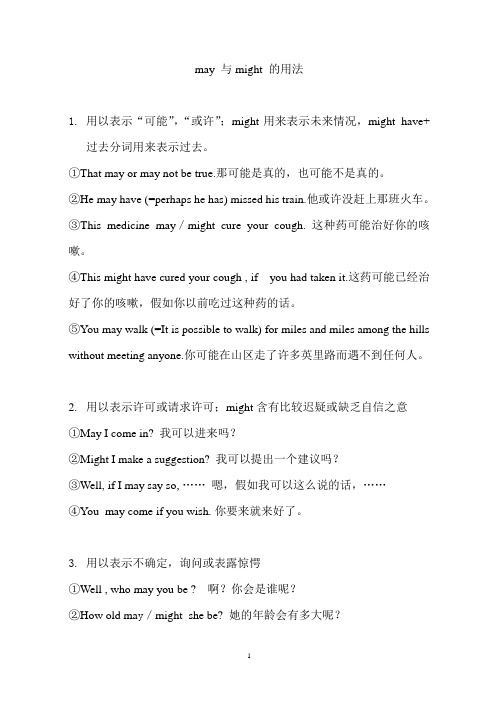
may 与might 的用法1.用以表示“可能”,“或许”;might用来表示未来情况,might have+过去分词用来表示过去。
①That may or may not be true.那可能是真的,也可能不是真的。
②He may have (=perhaps he has) missed his train.他或许没赶上那班火车。
③This medicine may/might cure your cough. 这种药可能治好你的咳嗽。
④This might have cured your cough , if you had taken it.这药可能已经治好了你的咳嗽,假如你以前吃过这种药的话。
⑤You may walk (=It is possible to walk) for miles and miles among the hills without meeting anyone.你可能在山区走了许多英里路而遇不到任何人。
2.用以表示许可或请求许可;might含有比较迟疑或缺乏自信之意①May I come in? 我可以进来吗?②Might I make a suggestion? 我可以提出一个建议吗?③Well, if I may say so,……嗯,假如我可以这么说的话,……④You may come if you wish.你要来就来好了。
3.用以表示不确定,询问或表露惊愕①Well , who may you be ? 啊?你会是谁呢?②How old ma y/might she be? 她的年龄会有多大呢?4.用以表示愿望和希望①May you both be happy!祝你们两位幸福!②Long may she live to enjoy her good fortune! 愿她长寿以享幸福!5.用以表示请求①You might do me a favour, Please do sth for me. 请你帮我一点忙。
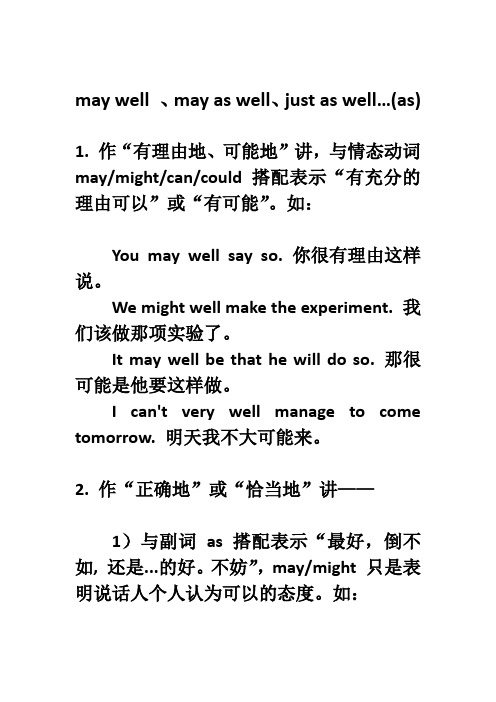
may well 、may as well、just as well…(as)1. 作“有理由地、可能地”讲,与情态动词may/might/can/could 搭配表示“有充分的理由可以”或“有可能”。
如:You may well say so. 你很有理由这样说。
We might well make the experiment. 我们该做那项实验了。
It may well be that he will do so. 那很可能是他要这样做。
I can't very well manage to come tomorrow. 明天我不大可能来。
2. 作“正确地”或“恰当地”讲——1)与副词as 搭配表示“最好,倒不如, 还是...的好。
不妨”,may/might 只是表明说话人个人认为可以的态度。
如:It may be as well to stop that young screamer. 但是最好还是让那个大哭大叫的孩子住声。
You may as well say so. 你不妨可以这样说。
We might as well make the experiment. 我们倒不如可以做那项实验了。
2)用在比较结构as well…as…中,如:It may be as well to stop that young screamer right away as usually. 但是最好还是可以像通常那样立刻让那个大哭大叫的孩子住声。
You may as well say so as you please. 你不妨可以随你的意思这样说。
3) 用在may/might just as well 中强调“最好、不妨”,表示“幸好可以, 也无妨”,如:You may just as well say so. 你这样说也无妨。
We might just as well make the experiment. 我们幸好可以做那项实验了。
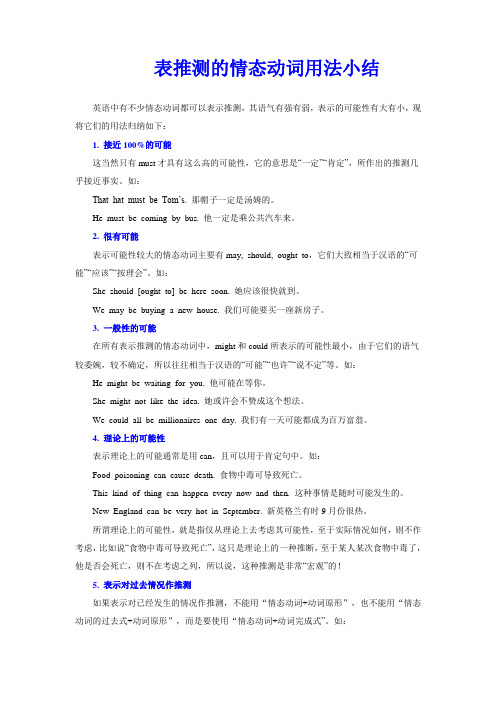
表推测的情态动词用法小结英语中有不少情态动词都可以表示推测,其语气有强有弱,表示的可能性有大有小,现将它们的用法归纳如下:1. 接近100%的可能这当然只有must才具有这么高的可能性,它的意思是“一定”“肯定”,所作出的推测几乎接近事实。
如:That hat must be Tom’s. 那帽子一定是汤姆的。
He must be coming by bus. 他一定是乘公共汽车来。
2. 很有可能表示可能性较大的情态动词主要有may, should, ought to,它们大致相当于汉语的“可能”“应该”“按理会”。
如:She should [ought to] be here soon. 她应该很快就到。
We may be buying a new house. 我们可能要买一座新房子。
3. 一般性的可能在所有表示推测的情态动词中,might和could所表示的可能性最小,由于它们的语气较委婉,较不确定,所以往往相当于汉语的“可能”“也许”“说不定”等。
如:He might be waiting for you. 他可能在等你。
She might not like the idea. 她或许会不赞成这个想法。
We could all be millionaires one day. 我们有一天可能都成为百万富翁。
4. 理论上的可能性表示理论上的可能通常是用can,且可以用于肯定句中。
如:Food poisoning can cause death. 食物中毒可导致死亡。
This kind of thing can happen every now and then. 这种事情是随时可能发生的。
New England can be very hot in September. 新英格兰有时9月份很热。
所谓理论上的可能性,就是指仅从理论上去考虑其可能性,至于实际情况如何,则不作考虑,比如说“食物中毒可导致死亡”,这只是理论上的一种推断,至于某人某次食物中毒了,他是否会死亡,则不在考虑之列,所以说,这种推测是非常“宏观”的!5. 表示对过去情况作推测如果表示对已经发生的情况作推测,不能用“情态动词+动词原形”,也不能用“情态动词的过去式+动词原形”,而是要使用“情态动词+动词完成式”。
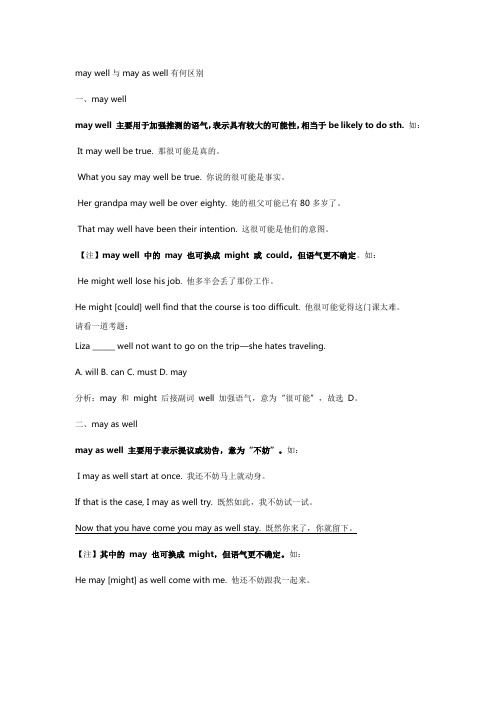
may well与may as well有何区别一、may wellmay well 主要用于加强推测的语气,表示具有较大的可能性,相当于be likely to do sth. 如: It may well be true. 那很可能是真的。
What you say may well be true. 你说的很可能是事实。
Her grandpa may well be over eighty. 她的祖父可能已有80多岁了。
That may well have been their intention. 这很可能是他们的意图。
【注】may well 中的may 也可换成might 或could,但语气更不确定。
如:He might well lose his job. 他多半会丢了那份工作。
He might [could] well find that the course is too difficult. 他很可能觉得这门课太难。
请看一道考题:Liza ______ well not want to go on the trip—she hates traveling.A. willB. canC. mustD. may分析:may 和might 后接副词well 加强语气,意为“很可能”,故选D。
二、may as wellmay as well 主要用于表示提议或劝告,意为“不妨”。
如:I may as well start at once. 我还不妨马上就动身。
If that is the case, I may as well try. 既然如此,我不妨试一试。
Now that you have come you may as well stay. 既然你来了,你就留下。
【注】其中的may 也可换成might,但语气更不确定。
如:He may [might] as well come with me. 他还不妨跟我一起来。
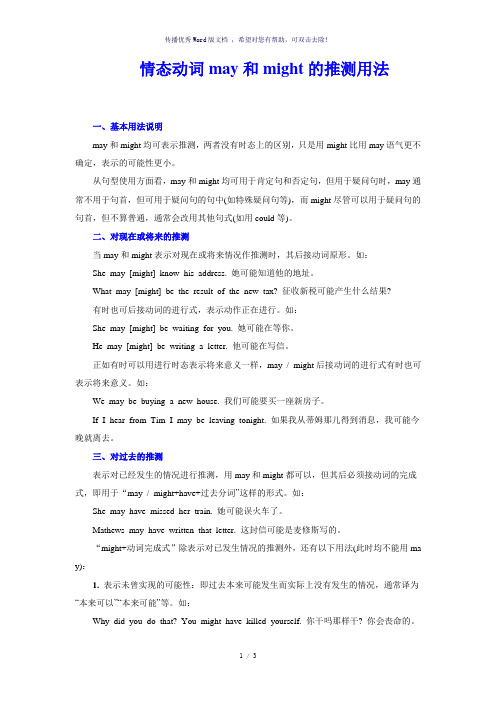
情态动词may和might的推测用法一、基本用法说明may和might均可表示推测,两者没有时态上的区别,只是用might比用may语气更不确定,表示的可能性更小。
从句型使用方面看,may和might均可用于肯定句和否定句,但用于疑问句时,may通常不用于句首,但可用于疑问句的句中(如特殊疑问句等),而might尽管可以用于疑问句的句首,但不算普通,通常会改用其他句式(如用could等)。
二、对现在或将来的推测当may和might表示对现在或将来情况作推测时,其后接动词原形。
如:She may [might] know his address. 她可能知道他的地址。
What may [might] be the result of the new tax? 征收新税可能产生什么结果?有时也可后接动词的进行式,表示动作正在进行。
如:She may [might] be waiting for you. 她可能在等你。
He may [might] be writing a letter. 他可能在写信。
正如有时可以用进行时态表示将来意义一样,may / might后接动词的进行式有时也可表示将来意义。
如:We may be buying a new house. 我们可能要买一座新房子。
If I hear from Tim I may be leaving tonight. 如果我从蒂姆那儿得到消息,我可能今晚就离去。
三、对过去的推测表示对已经发生的情况进行推测,用may和might都可以,但其后必须接动词的完成式,即用于“may / might+have+过去分词”这样的形式。
如:She may have missed her train. 她可能误火车了。
Mathews may have written that letter. 这封信可能是麦修斯写的。
“might+动词完成式”除表示对已发生情况的推测外,还有以下用法(此时均不能用ma y):1. 表示未曾实现的可能性:即过去本来可能发生而实际上没有发生的情况,通常译为“本来可以”“本来可能”等。
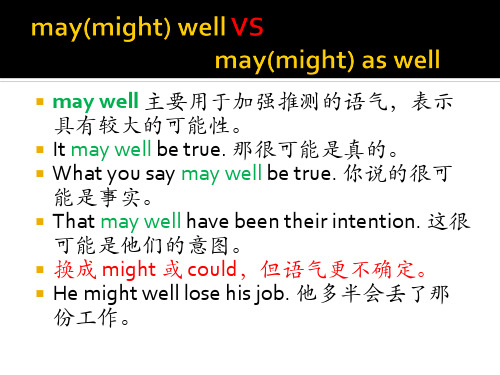
![[aswellas的用法]aswellas,aswell,mightaswell用法](https://img.taocdn.com/s1/m/07c71b3f4a73f242336c1eb91a37f111f1850d80.png)
[aswellas的用法]aswellas,aswell,mightaswell用法篇一: aswellas,aswell,mightaswell用法1. aswell as = not only/just...but,但两者在意义上有不同之处:as well as侧重前者,而not only/just...but侧重后者,通常要理解为A as well as B = not only/just B but A。
如:I’m learning French as well as English.我不仅学习法语而且还学习英语。
等于:I’m learning not only English but also French.[注意]在带有as wellas的句子中,如果该部分在句子中作主语,谓语动词必须与as well as前面的主语在人称和数上保持一致。
而not only/just...but连接句子中的并列主语时,谓语动词的人和数则必须与but后面的主语保持一致。
如:The teacher as well asthe students has gone to the cinema.老师和学生都到电影院看电影去了。
The students as wellas the teacher have gone to the cinema.Not only the teacherbut also the students have gone to the cinema.Peter rather than hisparents is going to the USA.是彼特打算去美国,而不是他的父妈妈。
Either you or I amwrong.要么是你要么是我错了。
2. as wellas所连接的并列成分有的时候没有侧重的含义,这时它的含义相当于and,但与and在以下3个方面有所不同:①as wellas比and更强调“又”的含义。
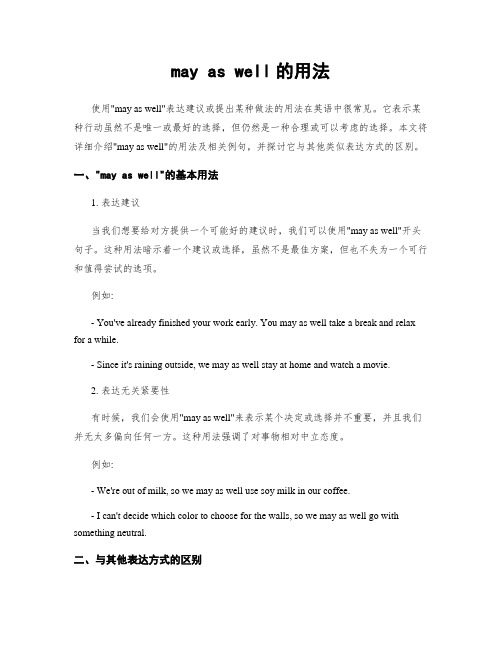
may as well的用法使用"may as well"表达建议或提出某种做法的用法在英语中很常见。
它表示某种行动虽然不是唯一或最好的选择,但仍然是一种合理或可以考虑的选择。
本文将详细介绍"may as well"的用法及相关例句,并探讨它与其他类似表达方式的区别。
一、"may as well"的基本用法1. 表达建议当我们想要给对方提供一个可能好的建议时,我们可以使用"may as well"开头句子。
这种用法暗示着一个建议或选择,虽然不是最佳方案,但也不失为一个可行和值得尝试的选项。
例如:- You've already finished your work early. You may as well take a break and relax for a while.- Since it's raining outside, we may as well stay at home and watch a movie.2. 表达无关紧要性有时候,我们会使用"may as well"来表示某个决定或选择并不重要,并且我们并无太多偏向任何一方。
这种用法强调了对事物相对中立态度。
例如:- We're out of milk, so we may as well use soy milk in our coffee.- I can't decide which color to choose for the walls, so we may as well go with something neutral.二、与其他表达方式的区别1. "May as well"与"might as well"的区别尽管在口语中我们常常可以互换使用它们,但从语法上来说,"may as well"比"might as well"更常见。
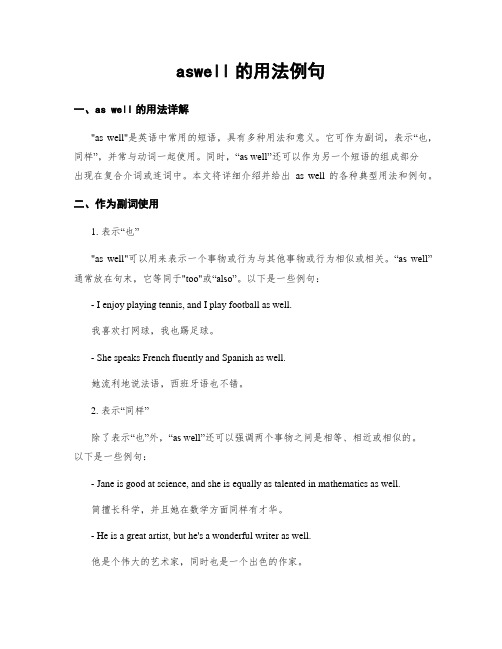
aswell的用法例句一、as well的用法详解"as well"是英语中常用的短语,具有多种用法和意义。
它可作为副词,表示“也,同样”,并常与动词一起使用。
同时,“as well”还可以作为另一个短语的组成部分出现在复合介词或连词中。
本文将详细介绍并给出as well的各种典型用法和例句。
二、作为副词使用1. 表示“也”"as well"可以用来表示一个事物或行为与其他事物或行为相似或相关。
“as well”通常放在句末,它等同于"too"或“also”。
以下是一些例句:- I enjoy playing tennis, and I play football as well.我喜欢打网球,我也踢足球。
- She speaks French fluently and Spanish as well.她流利地说法语,西班牙语也不错。
2. 表示“同样”除了表示“也”外,“as well”还可以强调两个事物之间是相等、相近或相似的。
以下是一些例句:- Jane is good at science, and she is equally as talented in mathematics as well.简擅长科学,并且她在数学方面同样有才华。
- He is a great artist, but he's a wonderful writer as well.他是个伟大的艺术家,同时也是一个出色的作家。
三、作为复合介词或连词部分使用1. 作为“as well as”的一部分"as well as"是一个常见的复合连词短语,表示除了主要事物之外还有其他附加事物。
以下是一些例句:- He is an expert in computer science, as well as a skillful programmer.他是计算机科学的专家,也是一个娴熟的程序员。
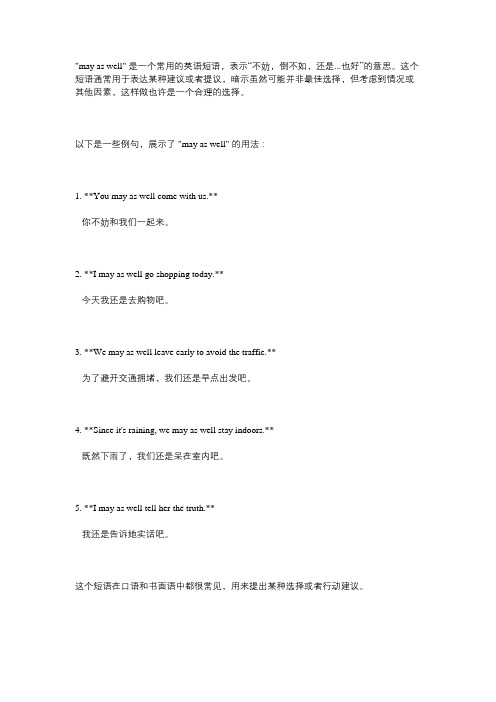
"may as well" 是一个常用的英语短语,表示“不妨,倒不如,还是...也好”的意思。
这个短语通常用于表达某种建议或者提议,暗示虽然可能并非最佳选择,但考虑到情况或其他因素,这样做也许是一个合理的选择。
以下是一些例句,展示了 "may as well" 的用法:1. **You may as well come with us.**你不妨和我们一起来。
2. **I may as well go shopping today.**今天我还是去购物吧。
3. **We may as well leave early to avoid the traffic.**为了避开交通拥堵,我们还是早点出发吧。
4. **Since it's raining, we may as well stay indoors.**既然下雨了,我们还是呆在室内吧。
5. **I may as well tell her the truth.**我还是告诉她实话吧。
这个短语在口语和书面语中都很常见,用来提出某种选择或者行动建议。
"May as well" 是一个用来表达建议、提议或者行动的英语短语,表示尽管并非最佳选择,但考虑到情况或其他因素,这样做也许是一个合理的选择。
它有点类似于 "might as well" 或 "could as well",都表示“不妨,还是...也好”的意思。
这个短语通常用于以下情况:1. 提出选择或建议:- You may as well call him now. (你不妨现在给他打电话)- We may as well go by train. (我们还是坐火车吧)2. 表示某种行动是合理的或必要的:- Since we have some extra time, we may as well finish the project today. (既然我们有额外的时间,我们还是今天把项目完成吧)- I may as well tell her the truth. (我还是告诉她实话吧)3. 指出某种选择虽然可能不是最佳的,但在特定情况下是合理的:- It's late, so we may as well stay here for the night. (已经很晚了,我们还是今晚留在这里吧)总之,"may as well" 常用于表达一种选择或建议,暗示尽管并非最佳选择,但在特定情况下是合理的。

might的用法总结归纳
may /might well 与may /might (just) as well 虽然只有一词之差,但含义迥异,稍不注意,容易混淆。
总的来说,may/might as well 是may /might as well as的省略形式,含比较含义,表示一种建议(recommendation ),后接动词原形、进行时和完成时;而may/ might well 则无比较含义,只是表示一种辩护的理由(justification),后接动词原形和完成时。
下面笔者拟根据一些权威词典和语法参考书,试就这两个句型的用法作一论述,不对之处,敬请各位同仁斧正。
一、may /might well 此句型结构中well 的作用是暗示较大的可能性,助动词本身只表可能性。
(见夸克等著《英语语法大全》P803),其英文解释为:used。
一、在做一件事没有更好的选择又没有理由不做的时候,我们可以使
用might as well 和may as well 来表达最容易或是最符合逻辑的行动。
它们都是非正式的表建议的说法,might as well 更为普遍。
例如:
You might as well tell them the truth.
你不妨告诉他们真相。
We may as well begin now.
我们不妨现在就开始。
You might as well get a taxi from the station. It’ll be quicker than me coming in to get you.
你不妨从车站叫辆出租车。
这比我来接你块。
A: Should we start now?
我们现在就开始吗?
B:Might as well. (非正式)
也可以。
A: What time does the film finish?
电影什么时候结束?
B: I think it’s ten o’clock.
我想是十点钟了。
A: Uh-huh. We may as well eat in town before it, then.
啊哈。
那么,我们还是先在城里吃饭吧。
The party was so dull that I might just as well have stayed home.
聚会太无聊了,我还不如呆在家里。
二、当要加强语气时,可以在might 和may 后加just,例如:
Well, I think if it’s a choice between a job and a place at college, you may just as well take the job. At least you’ll earn some money.
好吧,我想如果是在工作和上大学之间做出选择的话,你不妨接受这份工作。
至少你能挣点钱。
We don’t know anyone here and they’re discussing stuff that doesn’t concern us. We might just as well leave.
我们不认识这里的任何人,他们在讨论与我们无关的事情。
我们还是走吧。
三、在表达额外的可能性时,might as well 和might also,may as well 和may also 是不一样的意思,例如:
在你去远足之前,给自己买双好靴子。
你可能还需要买厚袜子。
正:Before you go hiking, buy yourself a good pair of boots. You may
also need to buy thick walking socks.
误:Before you go hiking, buy yourself a good pair of boots. You may as well need to buy thick walking socks.
解析:本句强调除了要买一双靴子,可能还需要买一双厚的袜子,虽然在表示建议,但不体现没有其他的选择了。